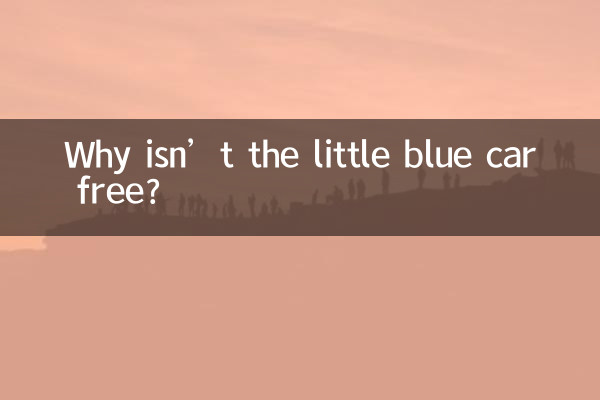Why isn’t the little blue car free? ——Looking at charging logic from the perspective of sharing economy model
Recently, the shared bicycle industry has become a hot topic again, especially the discussion about why the "little blue bikes" (represented by Hello Bicycle) do not provide free services. This article will analyze the charging logic of shared bicycles from the three dimensions of market data, operating costs and user behavior, combined with the hot content of the entire network in the past 10 days.
1. Data inventory of hot topics across the entire network (last 10 days)

| Ranking | hot topics | Number of discussions (10,000) | Related keywords |
|---|---|---|---|
| 1 | Shared bicycle prices increase | 45.6 | Little Blue Car, Hello, Meituan Bicycle |
| 2 | Traffic congestion in first-tier cities | 32.1 | Subway, bus, shared bicycle |
| 3 | Sharing economy profit model | 28.7 | Didi, power bank, bicycle charges |
| 4 | Users complain about bicycle dispatch fees | 18.3 | Difficulty returning the car, additional charges |
2. Why does Little Blue Car insist on charging?
1.High operating costs: Shared bicycles require continuous investment in hardware maintenance, vehicle dispatching, technology research and development, etc. According to public data, the average daily operation and maintenance cost of a single bicycle is about 1.5 yuan, which is difficult to cover under the free model.
| Cost item | Average annual cost (100 million yuan) |
|---|---|
| Hardware depreciation | 12.8 |
| Manual scheduling | 9.2 |
| Technology platform | 5.6 |
2.User behavior constraints: Free of charge may lead to misuse or private possession of the vehicle. For example, after a certain platform piloted free rides, the vehicle damage rate increased by 23%.
3.Industry competitive strategy: Leading companies have shifted from “cash-burning subsidies” to refined operations. HelloBike CEO once said: "Low price = sustainable, users are more willing to pay for high-quality services."
3. User disputes and platform response
User complaints in the past 10 days have mainly focused on:
The platform responded: "Dynamic pricing is to balance supply and demand, and the dispatch fee will optimize the prompt method."
4. Forecast of future trends
The shared bicycle industry may take the following directions:
Conclusion
The reason why the little blue car is not free is the inevitable choice of the sharing economy from barbaric growth to rational development. Users need to understand the business logic, and the platform also needs to improve transparency to achieve a win-win situation.

check the details

check the details